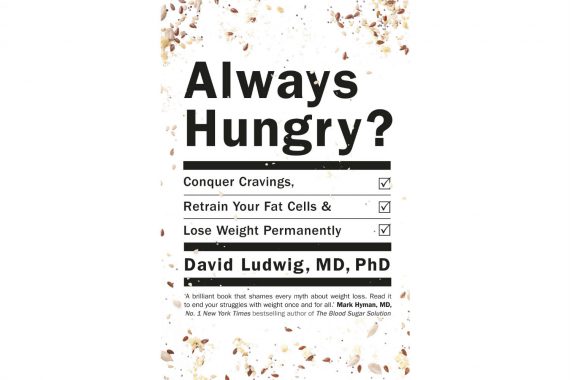Book review: Always Hungry? by Dr David Ludwig

Dr David Ludwig is an eminent and widely published practising endocrinologist and Harvard professor. Always Hungry?, published in January 2016, is Ludwig’s second foray into the diet book world.
The book will provide an invaluable practical guide for supporting overweight and obese patients
The book launches into a particularly polarised period in the history of nutritional research, with the low-fat camp pitted against the growing low-carb contingent. This has left practising doctors uncertain about the evidence and questioning what will work for their patients. With increasing uncertainty about the validity of the diet-heart hypothesis, which provided the scientific backbone for the low-fat doctrine, Ludwig’s intervention is timely.
Always Hungry? promises ’a diet without deprivation’ where adherents will ’conquer cravings, retrain their fat cells and lose weight permanently’. The familiar diet book formula is followed with the first few chapters devoted to the underpinning ideology and science, followed by a three phase plan, and then a selection of recipes. Ludwig takes things a step further by including his prescription for national health through policy change and governmental intervention.
Ludwig takes the reader through the science of satiety backed by a weighty reference and notes section. He makes the case for the importance of the quality of foods and rejects the overly simplistic calories-in calories-out model of obesity.
Reflecting on his own experiences as an obesity doctor prescribing low-calorie/ low-fat diets, and advising patients to ’eat less and move more’, he describes feeling ’like a failure as a physician’ when his patients came back having invariably gained weight. Spurred on by the disconnection between the science and the clinical reality, Ludwig focused his research on the science of weight loss and determined that there is little evidence to support standard obesity treatment. His perspective shifted, and instead of calorie counting he began to think of diets in an entirely different way ‘according to how food affects our bodies and, ultimately our fat cells.’
Dr Ludwig’s approach is a paradigm shift removing the ‘blame’ for obesity from an individual’s ’weakness of character’ to one based on fat cell metabolism and hormonal regulation. He explains that ’overeating doesn’t make us fat… the process of becoming fat makes us overeat’. He turns conventional wisdom on its head.
His model proposes that a diet high in refined carbohydrate and sugars leads to chronically elevated insulin levels acting as a ’fat cell fertilizer’ causing obesity. Criticising conventional calorie based approaches for focusing on the wrong target, he argues that overstimulated fat cells are in ’a frenzy… and while fat cells feast the rest of the body starves’. The body responds to this metabolic hunger through the starvation response, turning down the basal metabolic rate and ramping up hunger and preoccupation with food.
The Always Hungry? solution aims to tackle these problems through turning off the starvation mode, lowering insulin and inflammation levels, and incorporating evidence-based lifestyle changes such as improved sleep, stress relief and physical activity for well-being. The foundation of the programme is eating a real-food, carbohydrate restricted diet with adequate healthy fat and protein, while avoiding highly refined carbohydrates and sugar. The first phase requires macro-nutrient proportions of 50% fat, 25% protein, and 25% carbohydrate, which is in stark contrast to UK (and US) guidelines which currently recommend no more than 35% of calories from fat and 50% from carbohydrates. Phases two and three of the diet see a step-wise increase in the proportion of unrefined carbohydrates and a reduction in the proportion of fat, along with an ongoing focus on lifestyle measures.
Always Hungry? presents the complex science of obesity in an accessible and engaging way, with motivating patient testimonials providing a ‘real-world’ perspective. Ludwig argues persuasively that it is time to re-think the failed low-fat dogma, and expertly guides the reader through current nutritional controversies. He provides hope for those who’ve struggled with their weight and have been failed by conventional dietary advice and makes an evidence-based case for reducing carbohydrates and increasing healthy fats that is both passionate and convincing.
Critics have been keen to point out that the diet itself is based on a small, non-blinded pilot study. Ludwig has responded by arguing that the ‘higher-fat diet… is based on dozens of studies from my research team and hundreds of studies by others. No diet ever recommended (including by the government) has been proven by a definitive randomized controlled trial. So the relevant question isn’t whether there’s proof, but rather how the evidence for alternative approaches compares to conventional recommendations.’
Ludwig treads a careful path between the warring nutritional factions by emphasising ‘healthy fats’ while not eschewing wholegrains, and advocates a personalised approach to carbohydrate consumption based on a slow reintroduction to personal tolerance. Always Hungry? is an important and provocative analysis of current research into the obesity epidemic. Although aimed at the lay reader, it is packed with useful references and scientific analysis. There are useful analogies for explaining biological concepts to patients and the book will provide an invaluable practical guide for GPs and nurses in supporting their overweight and obese patients.
8/10
Dr Angharad Powell is a portfolio GP in the Wrexham area of North East Wales
Pulse October survey
Take our July 2025 survey to potentially win £1.000 worth of tokens

Visit Pulse Reference for details on 140 symptoms, including easily searchable symptoms and categories, offering you a free platform to check symptoms and receive potential diagnoses during consultations.










